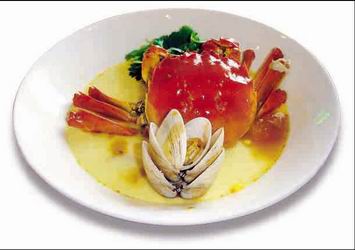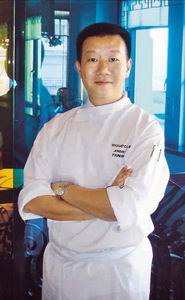Douglas williams/Shanghai Daily news
Of all the
dishes to be had in all of Shanghai the one that's probably the most
quintessentially Shanghainese in nature, as well as the one natives are most
enthusiastic about, must be the hairy crab.

Steamed hairy crab with Shaoxing wine and baby clams. ¡ª
DW
This is hairy crab season and the delicacy is being offered in all
Shanghainese restaurants worth their salt. Much has been written about hairy
crabs: the importance of their provenance, the various extensive attempts by
purveyors to fob off lesser crabs as originating in the all important Yangcheng
lake in neighboring Jiangsu Province and the merits of one gender over another.
Running till December at the Whampoa Club at Three on the Bund is a Crab
Feast Tasting menu - and a feast it is with seven courses. Each and every course
features the hairy crab in a variety of guises.
As a location to eat a humble
bowl of beef noodles the Whampoa Club would be hard to beat but as one of
Shanghai's best Shanghainese restaurants looking out over the city's Huangpu
life blood, it's the absolutely perfect place to eat exquisitely prepared hairy
crab.

The Whampoa Club¡¯s founding chef Jereme
Leung.
Chef Jereme Leung is from Hong Kong but he has made
Shanghainese cuisine and the Whampoa Club his life. "There are three main
strands to Shanghainese food," explained Leung, who spent his first six months
in the city learning all he could about this long underestimated style of
cooking: "The earlier influx of foreigners into the city created a lot of jobs,
mostly associated with the docks. This in turn attracted a great deal of labor
which flooded in from the surrounding provinces," said the founding chef of the
club.
Melting pot
"The food they ate had to replace the energy being lost
in the heavy work hence Shanghainese food tends to be quite sweet and salty,"
said Leung. "At the same time the existing Yangtze River Delta peasants had
their own type of food which was quite oily with intense flavors and then there
were the Western influences so Shanghainese really is a melting pot of
cuisines."
The stuffed crab claw, as the considerate though perpetually
joking chef pointed out, must be eaten with care to avoid the hot soup inside
squirting over the hapless diner. This is the third course after the first of
drunken crab with shaved ice. The ice is made from the wine that fatally
intoxicated the crab in the first case. The second is the crab powder and
asparagus ingeniously packed into an egg shell. Complex morsels; visually
enchanting; subtle and pure.
"Whilst we want to create food that is a step or
two above the traditional," said Leung, "we're not interested in creating a fine
dining experience. We don't want a formal experience with a rarefied atmosphere.
That's not the way Shanghainese people like to eat. Our customers want to be
able to speak the way I am now and not feel self-conscious."
The setting, the
furnishing and the decor are tastefully and traditionally Chinese in the Whampoa
Club with a number of beautiful, traditional private rooms available.
"We
want local people to eat here and not feel this is just a foreign representation
of a Shanghainese restaurant," said Leung.
A couple of crab and shark fin
combinations lead up to the main event: steamed hairy crab with Shaoxing wine
and baby clams. There's really only so much help the various accompanying
accoutrements can provide before it's face meets crab. Visions of brown bears on
Russia's Kamchatka peninsula gnawing and sucking out every milligram of
crustacean goodness springs to mind as legs crunch between teeth and crab stuff
dribbles down one's chin. It's primordial and messy but it's so tasty any
wastage would be a mortal sin. A crab and vegetable dish precede a noodle dish
before a sweet corn and ginger ice cream with honey and ginger tea conclude
proceedings.
An eating experience like nothing I've encountered.
The feast
costs 888 yuan (US$110).
Address: 3 Zhongshan No. 1 Rd E.
Tel:
6321-3737



